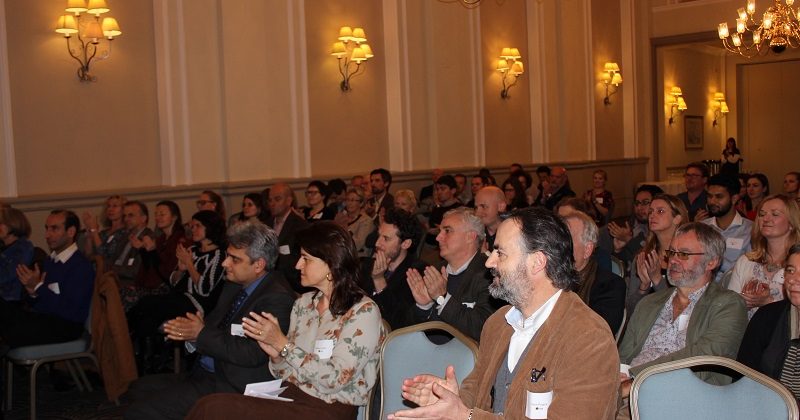Starting out
When Dane joined Itad in 1993 (he was consultant number four!), Itad had been in existence for nine years and already had a reputation for technical excellence and for being in the business for the right reasons. This was very much a reflection of the values of the then owners, Derek Poate and Mike Felton – one of their many legacies that live on in Itad.
For his first five years at Itad, Dane built his professional skills in M&E, including spending a year in the Philippines as M&E Adviser on a large EU community development programme.
In 1998, Dane moved to Brussels to work on a contract with the European Commission. He trained hundreds of people in the fine art of project cycle management and logframes.
He recalls:
“I took on a massive training contract when my own training skills and confidence were barely formed. It was trial by fire and very scary, but it worked out well and set me on course as a trainer and facilitator for years to come”.
Based on his own experiences, he has three tips for evaluators starting out today:
- Get good at basics: evaluation design and management, client and team management, fieldcraft (survey design, interview skills, etc.) and critical writing skills
- Pick your preferred fields to build your credentials as a specialist
- Keep taking on projects in unfamiliar fields to keep learning (“and so that you can also claim to be a generalist”)
Dane returned from Brussels to lead Itad’s Institutional Development and Training workgroup, which focused on evaluating and strengthening organisational performance and policy processes as well as designing and delivering training programmes. He was also on the steering group for DFID’s SPARC project in Nigeria, which was a foundation stone for our ongoing Nigeria portfolio.
Leading the company
In 2007, Dane, Julian Barr and Sarah Ockenden took over management of the company from the founders, Derek and Mike and, in 2011, Dane took on the formal role of Managing Director. During this period he led the company through a time of growth and transformation, responding to and informing major shifts that were taking place in the use of monitoring and evaluation in international development.
He says:
“As Managing Director, I had the privilege and challenge of encouraging staff to pitch in (using one of my over-used phrases “sharpen your elbows”) and then matching these different contributions to emerging strategy. I hope that everyone felt engaged and valued under my watch and I trust that this ethos (which I inherited from the founders, Derek and Mike) will remain firmly part of Itad’s culture well into the future.”
Dane was also instrumental in establishing the Centre for Development Impact and our partnership with IDS and the University of East Anglia, which helped us to be more robust, innovative and reflective in our thinking and practice on evaluation design and methods.
He reflects on the developments in evaluation methodology:
“Hopefully the period during which randomised control trials were held up as being the only true gold standard for any evaluation has come to an end and mixed methods have come to the fore. Having said that, the big methodological debates that kicked off in the late noughties really did challenge us (and everyone else) to update and improve our evaluation practices.
“In fact, setting up the Centre for Development Impact with IDS was framed around innovation and learning on mixed methods evaluations. Itad is now well-versed in a huge range of techniques across the quantitative and qualitative spectrum and I’m really proud of how far we’ve come.”

Looking ahead
It was also under Dane’s leadership that Itad codified the company’s values, which remain central to who we are and continue to guide the way we act.
So how does he see the future of the sector and the company?
“The pandemic has demonstrated the potential for, and limits of, remote working in the UK and overseas, requiring significant adjustments to our operating model that are likely to continue beyond the pandemic. These include less travel from the UK, more partnering and remote working with locally-based firms and associates, greater use of digital tech in data collection and analysis, and new challenges for partnership working, technical innovation and quality assurance.“
He reflects:
“As a strongly values-driven business, Itad faces the challenge of working increasingly through partnerships while continuing to stay true to its own vision, mission and values. I think this will mean a stronger investment in upfront and ongoing partnership working and quality assurance. Of course, we mustn’t just be in transmit mode. We must also receive and understand our partners’ ideas and values and that will act as a further driver of innovation within Itad.”
He also highlights the ethical challenges of remote data collection:
“We have to ask ourselves whose data is it and how it is collected and analysed, which presents us with the challenge of taking the longstanding principles of participation into the digital tech space. So if digital tech can enable us to extend our data reach and in a way that is more inclusive and participatory, we’ll all be winners.”
We thank Dane for his contribution to the company. We would not be where we are without him.
Read our 60 seconds interview with Dane from 2015.

